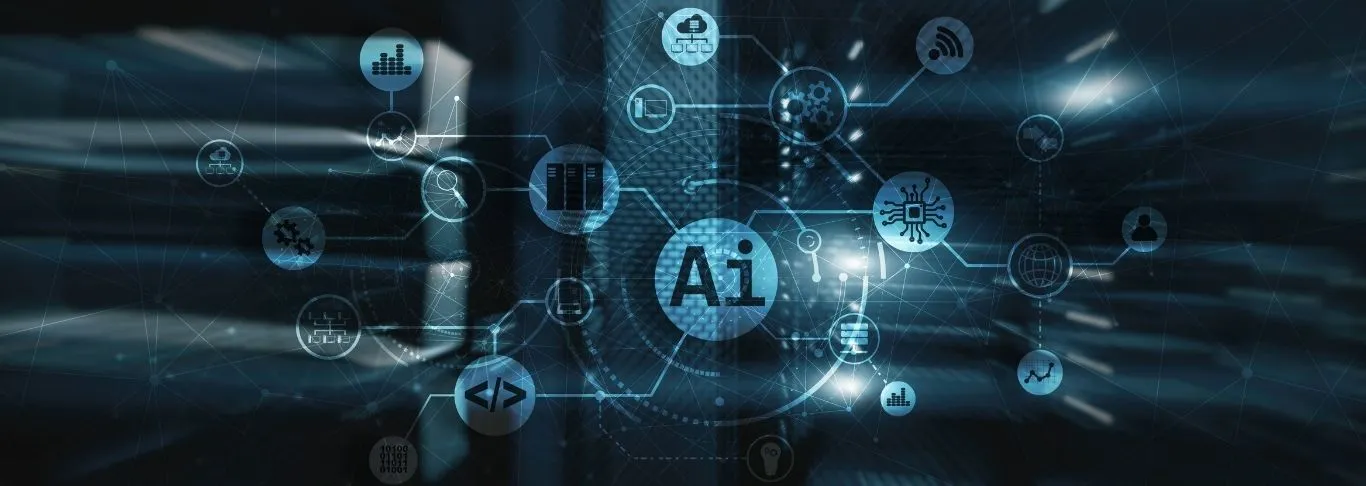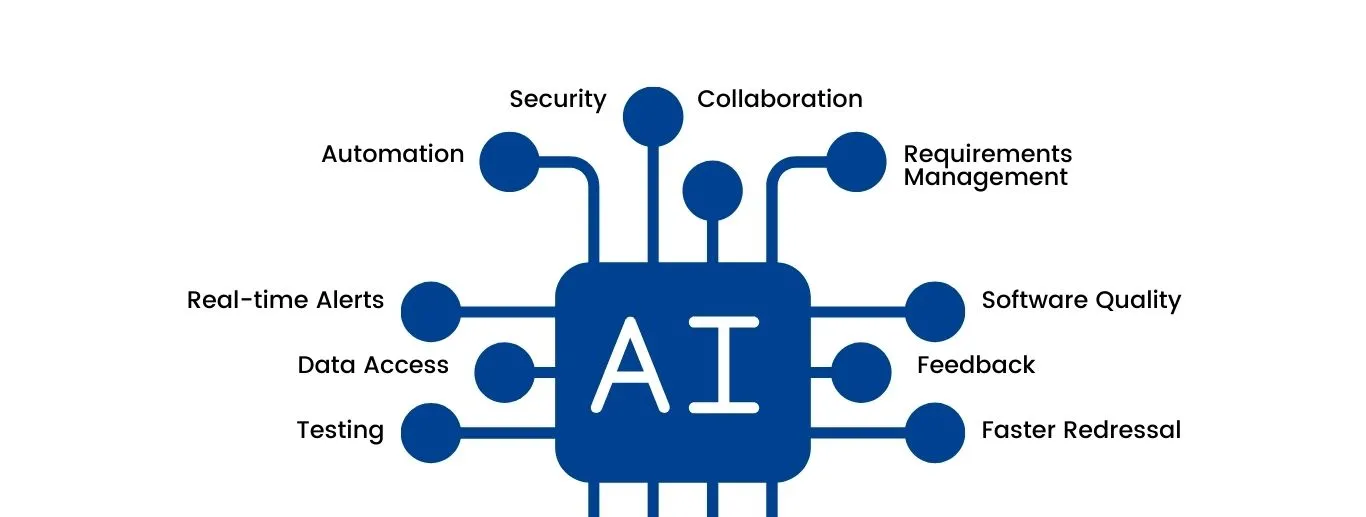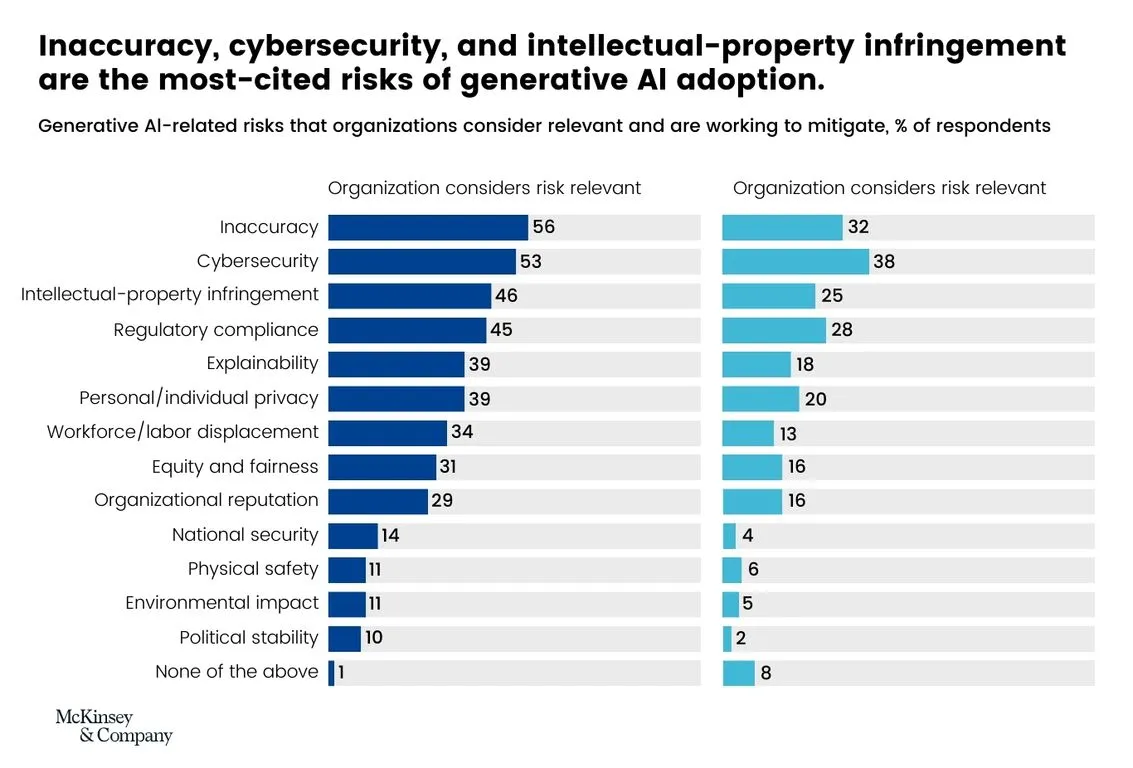DevOps is a transformative approach that has redefined the way organizations develop, deliver, and manage software. DevOps practices integrate development and IT operations, breaking down traditional silos and fostering a culture of collaboration, automation, and continuous improvement.
Elite DevOps teams deploy code several times a day. This is a piece of data from the 2021 DORA report. Puppet’s study adds that lead times at such teams are 8000 times faster. Furthermore, they experience lower failure rates, and when failures do occur, they can recover 2600 times faster. Such impressive statistics highlight the remarkable success that DevOps brings to software development and operations.
AI's Gaining Ground in Diverse Industries
We’d like to begin with a one-fact-says-all sentence — GenAI startups raised USD 1.5B in 2022. But Artificial Intelligence (AI) is not just about futuristic robots; it's about the powerful capabilities of machine learning, deep learning, and data analytics. According to McKinsey’s Survey, one-third of respondents are leveraging GenAI tools regularly. Thus, we are now living in a new era where we are surrounded by different AI models.
For instance, in the healthcare industry, AI is revolutionizing diagnostics and drug discovery. Companies like PathAI use AI algorithms to assist pathologists in identifying diseases from medical images, enhancing diagnostic accuracy.
In finance, robo-advisors are using AI to provide personalized investment recommendations and portfolio management services. Wealthfront, for instance, offers AI-driven financial planning to optimize investments based on individual goals and risk tolerance.
All this leads us to a quite logical question — what will happen if we mix AI and DevOps? Maybe it’s AI that is behind all the future breakthroughs.
How Do DevOps Teams Take Advantage of Artificial Intelligence?
In the DevOps field, the integration of Artificial Intelligence (AI) is transforming the way teams work. AI brings a set of advanced tools and capabilities that synergize seamlessly with DevOps principles. Here are five key hints on how can a DevOps team take advantage of AI.
Hint #1: Automate Testing and Quality Assurance
DevOps teams can use AI-powered testing tools to automate the identification of defects and vulnerabilities. These tools analyze code, identify potential issues, and even suggest fixes. For instance, AI-based testing platforms (like Applitools or Sauce Labs) can automatically generate test cases, detect patterns in code that might lead to errors, and continuously assess code quality throughout the development pipeline. This move will accelerate testing and improve the overall quality of the software.
Hint #2: Apply Predictive Analytics for Problem Resolution
DevOps encompasses various practices to make software deployment a more frequent and, hence, pleasurable process. That’s why you should consider a data-driven approach in your workflow — thus you’ll be sure you didn’t miss anything. AI-driven predictive analytics helps DevOps teams identify potential issues before they cause significant problems. AI analyzes historical data and then can predict when and where an incident might occur. For example, AI can detect abnormal patterns in server performance and alert the team to potential outages or slowdowns, allowing proactive actions to prevent issues. Obviously, there is still room for improvement in such a usage, but remember — history (any history, really) is cyclical.
Hint #3: Enhance Monitoring and Alerts
AI can analyze vast amounts of data from application and infrastructure monitoring. This way, you’ll get valuable insights into system “health” and performance. Moreover, set up your tool to generate alerts based on deviations from normal behavior, and it’ll suggest remedial actions. This real-time monitoring is crucial for maintaining high availability and reducing downtime.
Hint #4: Use Intelligent Automation
DevOps AI allows streamlining repetitive tasks in the DevOps pipeline. Leave code deployment and other routine tasks to AI-based systems. That way, you’ll reduce the risk of human error and accelerate release cycles.
Hint #5: Allocate Resources Efficiently
Optimize resource allocation in cloud environments with AI. These tools can analyze usage patterns and recommend the most cost-effective allocation of resources, ensuring that organizations get the most value from their cloud investments. It’s like a pocket advisor for your Google Drive/iCloud utilization but much more proficient.
Let’s Down To Earth With Some Examples
Netflix: Netflix employs AI for content delivery and recommendation algorithms. It uses AI-driven predictive analytics to optimize server allocation and content distribution, ensuring a seamless streaming experience for users.
Google: Google has incorporated AI into its software development pipeline. It uses AI to automate code reviews, detect bugs, and improve the quality of its codebase. This has led to faster development cycles and higher code quality.
AI in DevOps practices is increasingly becoming a necessity, allowing organizations to improve efficiency, reduce errors, and enhance the overall software development process.
How is your transformation going?
How to Implement AI in DevOps
Implementing AI in DevOps is a strategic process that requires careful thinking-over (not overthinking!). Here's a step-by-step guide you can use to incorporate AI into your DevOps workflows effectively.
- Define Objectives and Use Cases:
Begin with identifying specific objectives and potential use cases for integrating AI. Assess all the areas of your workflow and determine the ones where AI can bring the most value. It can be automating repetitive tasks, enhancing predictive analytics, or already mentioned improving decision-making.
- Select the Right AI Tools and Technologies:
You don’t eat a soup with a fork. Choosing appropriate tool and technologies is paramount. For instance, machine learning DevOps frameworks like TensorFlow or scikit-learn can be used for predictive analytics, while AIOps platforms like Splunk or Dynatrace can automate incident detection and resolution. Catch up with Netflix, which utilizes DevOps machine learning models to optimize content recommendation algorithms for a better user experience.
- Assess Data Readiness:
Ensure that your data is prepared for AI integration. Clean and consolidate your data sources to make them accessible for AI algorithms. AI's effectiveness relies on high-quality, well-structured data.
- Taste AI Solutions:
Start with pilot projects to validate the effectiveness of AI integration. These temporary projects can help you fine-tune AI algorithms and processes. Consider automating a specific DevOps task, like code testing or performance monitoring.
- Monitor and Evaluate:
Once AI is integrated into DevOps workflows, continuous monitoring and evaluation are your next steps. Monitor the performance of AI algorithms and gather feedback from teams to make necessary adjustments.
- Address Challenges and Considerations:
While implementing AI in DevOps, it's crucial to address potential challenges. These may include data privacy and security concerns, ethics and bias in AI, and the need for AI expertise within the team. Establish clear politics for data handling, and ensure AI models are transparent and explainable.
- Training and Skill Development:
As AI becomes a more integral part of DevOps, invest in training and upskilling your teams. Your team’s ability is your future. Provide opportunities for colleagues to learn about AI technologies and best practices for integrating AI into their workflows.
- Scale and Optimize:
After successful pilot projects, scale AI integration across the organization. Continue to optimize AI algorithms and tools to meet the evolving needs of your DevOps processes.
Enhancing the Performance of AI in DevOps Problem-Solving
Artificial Intelligence (AI) plays a pivotal role in enhancing problem-solving within DevOps contexts. Here, we explore AI's problem-solving capabilities and its impact on DevOps processes.
AI-Driven Incident Resolution
One of the key areas where AI excels is incident resolution and troubleshooting. AI can analyze vast amounts of data in real time, identifying patterns and anomalies that may not be apparent to human operators. Google, already mentioned Netflix and other mastodons leverage Artificial Intelligence to improve solving their flaws.
Continuous Improvement with AI
However, problem-solving is not the one and only way to use AI — it also continuously improves DevOps processes. By analyzing past data, AI can identify areas of improvement and suggest optimizations. For example, AI conducts an analysis, detects bad patterns in software releases, and recommends strategies to enhance the release process. And you’ll notice — this leads to increased efficiency and reduced errors.
Two Cases to Note
Case 1: Netflix uses AI to monitor its infrastructure for potential problems. When a problem is detected, AI is used to identify the root cause of the problem and to recommend a solution. This has helped Netflix to reduce the time it takes to resolve incidents.
Case 2: Google uses AI to analyze logs and other data to identify the root cause of problems. AI is also used to recommend and implement solutions to problems.
What Limitations You Can Encounter When Using AI in DevOps
Ancient Greeks said “Nothing over the top”. Quite a good saying that also applies to DevOps. You must have a balanced perspective by acknowledging the challenges and limitations that may arise when incorporating Artificial Intelligence.
Data Privacy Concerns
AI is a model, so it doesn’t give a [you know the word needed here] in terms of privacy and copyrights. AI systems rely on data for training and decision-making. While many AI-related companies already stated that they have changed the way models operate data, it’s still many blind spots in this area. Organizations must navigate the fine line between leveraging data for AI-driven insights and respecting data privacy regulations.
Bias in AI
AI algorithms can inherit bias present in training data, leading to unintended discriminatory outcomes. For example, gender bias or racial bias. So DevOps teams must actively reduce bias by diversifying training datasets and regularly auditing AI systems. Fairness-aware machine learning techniques can help in identifying and mitigating biases within AI models.
Job Displacement
The automation capabilities of AI may raise concerns about potential job displacement within DevOps teams. LinkedIn recently announced the next wave of layoffs totaling over 1200 in the 2022-2023 period. Yet, a more nuanced view suggests that AI can augment human work, freeing up professionals to focus on higher-level tasks and creative problem-solving. Plan upskilling and reskilling programs to ensure your teams are equipped to work alongside AI.
Strategies for Risk Mitigation
To maximize the benefits of AI while addressing these limitations, organizations should adopt a proactive approach. This includes implementing comprehensive data governance practices, investing in AI explainability tools, and fostering a culture of ethical AI use. Encouraging collaboration between data scientists, data privacy experts, and DevOps engineers is essential for mitigating risks effectively.
To sum it up
The integration of AI into DevOps represents a transformative shift in modern software development. Artificial Intelligence empowers DevOps teams to streamline processes, enhance problem-solving, and achieve higher levels of efficiency and reliability.
That’s why the symbiotic relationship between AI and DevOps continues to evolve. As AI technologies advance, DevOps practices will become more sophisticated and responsive to the ever-changing landscape of software development. Organizations that embrace AI integration will more likely turn their competitive market into a one-horse race.
And again, AI is not a replacement for human expertise but a catalyst for the evolution of any activity, including DevOps. Embrace AI, and you will unlock new possibilities, optimize your DevOps practices, and chart a course toward innovation and success in the digital era.





